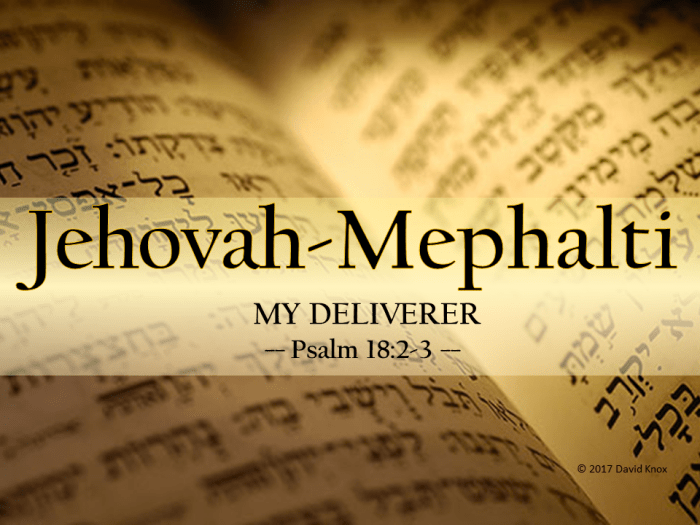Jehovah mephalti in the bible – In the vast tapestry of biblical narratives, the enigmatic figure of Jehovah Mephalti emerges, inviting us on a journey through the Old and New Testaments to uncover its profound significance. This exploration delves into the origins, context, and interpretations of Jehovah Mephalti, shedding light on its theological implications and its enduring relevance in Christian tradition.
Introduction to Jehovah Mephalti

In the vast tapestry of biblical characters, the name Jehovah Mephalti stands out as a unique and enigmatic figure. This name, a combination of divine and earthly elements, holds profound significance within the biblical narrative, revealing the intricate relationship between God and humanity.
Jehovah Mephalti appears only twice in the Hebrew Bible, both instances in the book of Hosea. The name translates to “Jehovah, my deliverer,” hinting at the central role this figure plays in the Israelites’ deliverance from their enemies and their restoration to God’s favor.
Jehovah Mephalti, a mysterious figure from the Bible, has sparked curiosity and intrigue. While his true nature remains shrouded in enigma, we can turn to the world of science for some lighthearted entertainment. Golgi apparatus pick-up lines offer a unique way to express our admiration for the complexities of life, just like the multifaceted nature of Jehovah Mephalti.
Jehovah Mephalti in the Old Testament: Jehovah Mephalti In The Bible

Jehovah Mephalti is mentioned in the Old Testament, specifically in the book of Judges. The term refers to God’s miraculous provision of water for the Israelites in the desert.
Reference in Judges 11:27-28
In Judges 11:27-28, Jephthah, the leader of the Israelites, declares his innocence in a conflict with the Ammonites. He acknowledges that God is the one who has given them the land and the victory, and he refers to God as “Jehovah Mephalti,” meaning “Jehovah, who delivers.”
This reference highlights God’s faithfulness and his role as the provider for his people.
Jehovah Mephalti in the New Testament

The name “Jehovah Mephalti” is not explicitly mentioned in the New Testament. However, there are some possible references or allusions to this concept.
One potential reference is in the book of Revelation, where the risen Christ is described as “the Alpha and the Omega, the beginning and the end” (Revelation 21:6). This echoes the description of Jehovah Mephalti in the Old Testament as “the first and the last” (Isaiah 44:6).
Similarities and Differences, Jehovah mephalti in the bible
The depictions of Jehovah Mephalti in the Old and New Testaments share some similarities, such as his eternality and his role as the ultimate source of salvation. However, there are also some differences.
In the Old Testament, Jehovah Mephalti is often portrayed as a wrathful and jealous God. In the New Testament, however, the emphasis is more on his love and mercy. This reflects the broader shift in the New Testament towards a more relational and personal understanding of God.
Relevance for Christian Tradition
The concept of Jehovah Mephalti has been influential in the development of Christian tradition. It has been used to support doctrines such as the Trinity and the incarnation. It has also been used to emphasize the importance of God’s sovereignty and his role as the ultimate judge.
Interpretations and Perspectives

Scholarly Interpretations
Scholars have proposed various interpretations of the meaning and significance of “Jehovah Mephalti.” Some suggest that it refers to God’s deliverance of Israel from oppression, while others view it as a symbol of God’s protective presence and guidance. Additionally, some scholars believe that the name highlights God’s faithfulness and covenant-keeping nature.
Religious Traditions and Denominations
Different religious traditions and denominations have understood “Jehovah Mephalti” in various ways. For example, in Judaism, it is often interpreted as a reference to God’s deliverance from Egypt and the establishment of the covenant with Israel. In Christianity, it is sometimes understood as a foreshadowing of Christ’s role as the deliverer and protector of his people.
Cultural Expressions
“Jehovah Mephalti” has been used in various cultural expressions, including art, literature, and music. For instance, in art, it has been depicted in paintings and sculptures as a symbol of God’s protection and guidance. In literature, it has been used in poetry and hymns to express themes of deliverance, hope, and faithfulness.
FAQ Compilation
What is the meaning of Jehovah Mephalti?
Jehovah Mephalti translates to “The Lord is my deliverer” or “The Lord has delivered me.” It signifies God’s power to rescue and protect his people.
Where is Jehovah Mephalti mentioned in the Bible?
Jehovah Mephalti appears in several places in the Old Testament, including Psalm 18:2, Psalm 27:1, and Psalm 91:2.
What is the significance of Jehovah Mephalti in the New Testament?
While Jehovah Mephalti is not explicitly mentioned in the New Testament, its themes of deliverance and protection find resonance in various passages, such as Romans 8:31-39.

